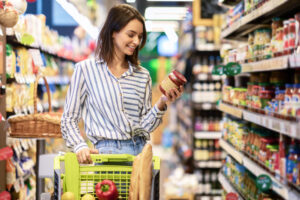
Grocery prices inflation reached a high of 17.1 per cent last month, with the fastest rises recorded in essentials such as milk, eggs and margarine.
The increase in food costs in the four weeks to February 19 would add a potential £811 to annual shopping bills, according to the data gathered by Kantar, the market researcher.
The pressure is not limited to food items, with non-food inflation rising to a record of 5.3 per cent in February, a separate index by the British Retail Consortium and NielsenIQ shows.
The high prices of energy and running costs for companies, as well as tougher trading conditions brought about by the war in Ukraine, have led retailers to push up prices, according to Helen Dickinson, the consortium’s chief executive. The biggest price rises among non-food items were for gardening tools and pet food.
Overall inflation in shop prices rose to 8.4 per cent in February, up from 8 per cent in January. The biggest rise was recorded in fresh food, which rose to 16.3 per cent, up from 15.7 per cent in January.
Fraser McKevitt, head of retail and consumer insight at Kantar, said: “This February marks a full year since monthly grocery inflation climbed above 4 per cent. This is having a big impact on people’s lives.”
He said its research showed that grocery prices inflation was the second most important financial issue for the public behind energy costs, with two thirds of people concerned by food and drink prices, above public sector strikes and climate change. “One quarter say they’re struggling financially, versus one in five this time last year. The numbers speak for themselves.”
Although consumer prices inflation has been falling — down from a peak of 11.1 per cent in October to 10.1 per cent in January — household incomes are under pressure not only from higher food prices but also from cuts in government support on energy bills and rising mortgage costs.
Kantar said sales of own-label products were up by 13.2 per cent in February, well ahead of the growth in branded products of 4.6 per cent. It said grocery sales had increased by 8.1 per cent over the 12 weeks to February 19, masking a drop in volumes when accounting for inflation.
The data was published as supermarkets face shortages of fruit and vegetables. Kantar said the shortage, caused by supply chain issues, was not captured in its latest data but it would follow the impact on sales in the coming weeks.
The figures were boosted by Valentine’s Day. Steak sales rose by a quarter in the seven days to February 14 compared with the previous week, sparkling wine sales doubled and shoppers spent an extra £5 million on boxed chocolates.
Sales of cold treatments rose by 82 per cent last month, with cough liquids up 78 per cent and cough lozenges 70 per cent higher.
Aldi and Lidl, the German-owned discounters, were again the fastest-growing grocers, partly thanks to store openings, with sales up 26.7 per cent and 25.4 per cent, respectively. Aldi’s market share rose to 9.4 per cent and Lidl’s to 7.1 per cent.
Sales at Tesco, the market leader with a 27.3 per cent share, rose by 6.6 per cent, with Sainsbury’s up 6.2 per cent and Asda up 5.9 per cent. Morrisons was the only supermarket to report a fall in sales, down 0.9 per cent.
Speaking to MPs on the Commons’ business select committee yesterday, Caroline Keohane, head of industry growth policy at the Food and Drink Federation, said: “We are expecting food prices inflation to remain for some time and having that cost pressure.”
Read more:
UK facing double blow on inflation






